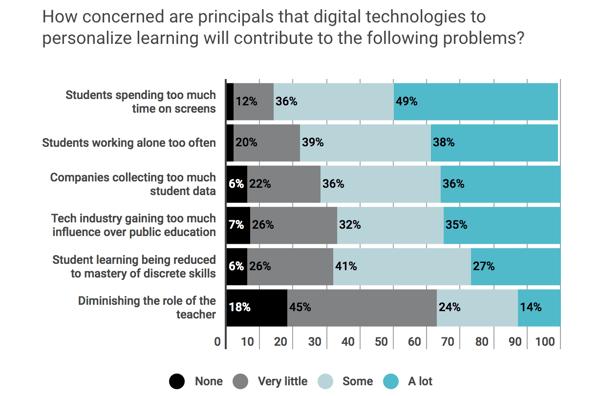Last week I heard a district leader say, “In God We Trust - everyone else, bring data.” I chuckled - because we talk out of both sides of our mouth when it comes to data. In the same breath we demand “data driven instruction” instruction in our classrooms but it’s also clear that we don’t understand (and many times don’t trust) the technology that captures this very data needed to drive instruction. Also last week, Ed Week highlighted this dichotomy in the survey results of school leaders on the use of technology with their students. A majority (57%) believe that ‘digital technologies are an important supplemental resource used to personalize the learning experience based on each student’s strengths, weaknesses, and preferences.’ Yet an even higher percentage of school leaders still have valid concerns with how technology companies collect data and influence what and how we teach students.

Rightfully so - there seem to be news reports of how companies use and collect our data daily. And any time a breach of data takes the media by storm, we can’t help but wonder what that means about not only our own personal data but also about our students. We are upset with what resulted in the Facebook/Cambridge Analytica situation because we feel deceived and it highlights our ignorance. David Dayen wrote, Facebook “traps users in a devil’s bargain of being subjected to surveillance if they want to connect with friends and relatives online.” Many of us lack a true understanding of how digital tools access our data, how to keep our data secure, or how to interpret data sharing agreements. We face this dilemma not only in our lives but also in education: many of the edtech products and learning tools we access every day are using our data to target us and to sell to us.
These concerns and fears directly impact the decisions that are made at our schools to support and use technology. We work with many clients that carefully filter out sites and apps from use on their network. But we can’t expect blocking access to “the one app with the most recent data breach” or “the one tool that was used with malicious intent by a student” to create a data-rich and data-relevant environment. We also work with districts who interpret the fine print Ts & Cs of edtech apps and learning platforms for their educators, creating lists of approved sites and tools. The reality is that students and teachers find new apps and sites every day - and new ones are released all the time, so it’s impossible to control access or evaluate all relevant tools.
School and district leaders must set the vision for how technology supports learning, stay current on the trends and latest tools, and navigate procurement rules and vendor pressures, all while responding to stakeholders when issues arise. We find that when we sit with district leaders to first strategize about a curriculum mix that incorporates foundational, adaptive, and highly customized content, then we are able to better understand why we “hire” different pieces of online and offline content. It’s even more impactful if we can articulate the value and benefits of digital content and tools, especially in terms of how those tools and the data can help us personalize the learning environment for each student.
Therefore, we believe that we need to change the culture of adult conversations about data first, so that we can appropriately support our children in this murky world.
-
This means expanding data citizenship conversations beyond a single course and extending data stewardship and data security responsibilities beyond a single role in schools. It needs to wiggle its way into all data-rich conversations and be embedded into routines whenever students are ‘powering up.’ We want educators to be better informed about what our rights are, what goes into the security of our data, and what the regulations are that protect the use of our data in schools and with our students.
-
We must arm school leaders and educators with foundational knowledge about the data they have access to, the technology and apps in their classrooms, and how to protect and secure themselves (and their students) while accessing these tools, is critical. There are great resources out there that help educators and students learn more about their data and how to decipher ‘coded’ language when selecting tools for classroom and at home use. There are also frameworks and guidelines to assist district leaders across academia and technology find and evaluate tools to purchase and support across grades. Take a look at the resources available from the Data Quality Campaign, Common Sense Media, Digital Promise, COSN, and SETDA (to name a few).
-
We have to ask the right questions to understand the benefits of digital tools without compromising data security and personal safety. A big piece of this is understanding the trade-offs and implications of using different platforms and of sharing different types of data. What are the motivations behind an app and its developer? What’s the revenue stream for the app? Are they trying to sell me something?
We advocate bringing these topics to the surface and discuss them out in the open - even when we aren’t experts. We need to have informed conversations about data security and privacy in our classrooms and across our schools. This is why we are concerned about recent news stories that cast 21st-century technology in a sinister light or as a shrug-your-shoulders, can-never-be-understood concept. We as adults cannot close our eyes and claim ignorance if we are to hope to properly guide our children.




